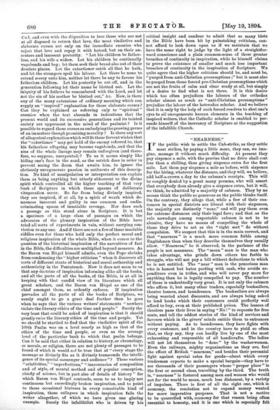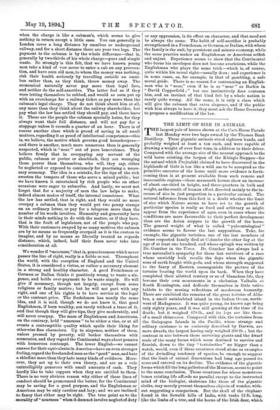"NEARNESS."
IF the public wish to settle the Cab-strike, as they settle most strikes, by paying a little more, they can, we ima- gine, manage it without much difficulty. At present they pay sixpence a mile, with the proviso that no drive shall cost less than a shilling, thus giving sixpence extra for the first mile. Let them pay sixpence a mile as before, with sixpence for the hiring, whatever the distance, and they will, we believe, add half-a-crown a day to the cabman's receipts. This will be roughly denied by a great many persons, who will assert that everybody does already give a sixpence extra, but it will, we think, be admitted by a majority of cabmen. They by no means think the public so generous as the public thinks itself. On the contrary, they allege that, while a few of their cus- tomers in special districts are liberal with their sixpences, the majority are distinctly "near," and will pay them even for extreme distances only their legal fare ; and that as the rule nowadays among respectable cabmen is not to be abusive, they have no means of compelling the whole of those they drive to act as the "right sort" do without compulsion. We suspect that this is in the main correct, and that " nearness " is a much more common foible among Englishmen than when they describe themselves they usually allow. "Nearness," be it observed, in the parlance of the people is not meanness. The " mean " man is the man who takes advantage, who grinds down others too feeble to struggle, who will not pay a bill without deductions to which he is not entitled. The " near " man is the penurious man who is honest but hates parting with cash, who avoids ex- penditure even in trifles, and who will never pay more for anything than be is legally compelled to pay. The number of these is undoubtedly very great. It is not only the cabmen who affirm it, but many other traders, especially booksellers, theatre lessees, and laundresses. The booksellers are always being worried about discounts, and are always being asked to lend books which their customers could perfectly well afford to buy, even at their published prices. The lessees of theatres pass their lives in saying " No " to requests for free seats, and tell the oddest stories of the kind of services and favours which in the givers' minds entitle them to entrances without paying. As to laundresses, they have fights with every customer, and in the country have to yield so often that, as they say, they can hardly live by one of the most exhausting and responsible of all handicrafts. The ladies will not let themselves be " done " by the washerwomen. Even the railways, mighty organisations as they are, feel the effect of British "nearness," and besides their perennial fight against special rates for goods—about which every tradesman expects to make a special bargain—they have to see thousands of their passengers whose "proper place" is the first or second class, travelling by the third. The truth is, " nearness " is fostered among men and women who would not for the world be mean, much less dishonest, by a variety of impulses. There is first of all the right one, which is economy, the resolution not to expend money wanted for more imperative purposes. That is not a motive to be quarrelled with, economy for that reason being often essential to honesty, and it is one which is especially felt
when the charge is like a cabman's, which seems to give nothing in return except a little ease. You can generally in London cover a long distance by omnibus or underground railway, and for a short distance there are your two legs. The payment to the cabman is by the whole difference—that is, generally by two-thirds of his whole charge—pure and simple waste. So strongly is this felt, that we have known young men take a kind of vow never to enter a cab on any provoca- tion, and have seen old men, to whom the money was nothing, risk their health seriously by travelling outside an omni- bus rather than, as they think, throw money away. The economical naturally never pay more than legal fare, and neither do the self-assertive. The latter feel as if they were letting themselves be robbed, and would as soon put up with an overcharge for a railway ticket as pay more than the cabman's legal charge. They do not think about him at all, any more than they think about the railway shareholder, but pay what the law has settled they should pay, and there leave it. These are the people the cabman specially hates, for they always want their full distance, and will not pay for a stoppage unless it exceeds a quarter of an hour. There is of course another class which is proud of saving in all small matters, regarding it as proof of intellectual competence—this is, we believe, the motive which governs good housekeepers— and there is another, much more numerous than is generally suspected, which is " near " out of pure benevolence. They believe firmly that in overpaying any servant of the public, cabman or porter or shoeblack, they are wronging those poorer than themselves, who will, they say, either be neglected or exposed to contumely for practising a neces- sary economy. The idea is a mistake, for the tips of the rich sweeten the tempers of those who serve a mixed public ; but we have known it entertained by rich people who on other occasions were eager to subscribe. And lastly, we must not forget that for a majority of men the law helps to make, indeed almost makes of itself, the internal conscience. What the law has settled, that is right, and they would no more overpay a cabman than they would put two penny stamps on an ordinary letter, or pay for a telegram more than the number of its words involves. Humanity and generosity have in their minds nothing to do with the matter, or if they have, that is the fault of legislators, not of the people who pay. With their customers swayed by so many motives the cabmen are by no means so frequently overpaid as it is the custom to imagine, and by no means so liberally treated as regards distance, which, indeed, half their fares never take into -consideration at all.
We wonder if !falearness," that is, penuriousness which never passes the line of right, really is a foible or not. Throughout the world, with the exception of England and the United States, it is considered a virtue, or rather a necessary element in a strong and healthy character. A good Frenchman or German or Italian thinks it positively wrong to waste a six- pence, and holds over-payment to be waste simply. He will _give if necessary, though not largely, except from some religions or family motive ; but he will not part with any right, and one of his rights is to have service at the legal or the contract price. The Scotchman has nearly the same idea, and it is said, though we do not know it, that good Englishmen, if born wealthy, are rarely without a trace of it, and that though they will give tips, they give moderately, and will never overpay. The mass of Englishmen and Americans, -on the contrary, hold " nearness " to be either a vice, or at all -events a contemptible quality which spoils their liking for otherwise fine characters. Up to sixpence, neither of them, unless pressed by poverty, will bother themselves with -economies, and they regard the Continental ways about pennies with humorous contempt. The lower English—we cannot -answer for their equivalents in America—have an even stronger feeling, regard the freehanded man as the "good" man, and hate a skinflint more than they hate many kinds of evildoers. More- .over, they act up to their own theory, and are as a rule unintelligibly generous with small amounts of cash. They ,hardly like to take coppers when they are entitled to them. There is no very obvious reason why either of these lines of conduct should be pronounced the better, for the Continental may be saving for a good purpose, and the Englishman or American may be only careless and lazy; and we are inclined to fancy that either may be right. The true point as to the ,morality of" nearness" when it does not involve neglect of duty or any oppression, is its effect on character, and that need not be always the same. The habit of self-sacrifice is probably strengthened in a Frenchman, or German, or Italian, with whom the family is the unit, by persistent and minute economy, while the same practice makes an Englishman or American selfish and unjust. Experience seems to show that the Continental who turns his envelopes does not become avaricious, while the Englishman who plays the same trick—which is, of course, quite within his moral right—usually does ; and experience is in some cases, as, for example, in that of gambling, a safe moral guide. There is no reason for contemning an English- man who is "near," even if he is as " near " as Barkis in "David Copperfield ; " but one instinctively does contemn him, and an instinct of that kind felt by a whole nation is rarely quite wrong. All the same, it is only a class which will give the cabman that extra sixpence, and if the public wish him always to have it, they must ask the Home Secretary to propose a modification of the law.







































 Previous page
Previous page